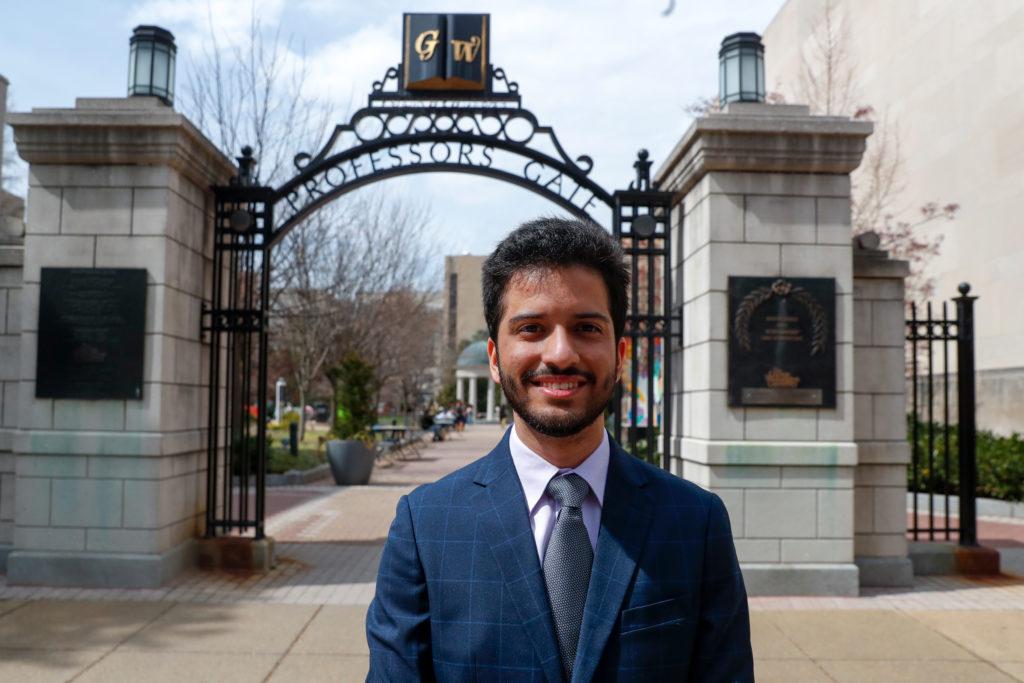The vice president of external affairs of the GW Entrepreneurship Club announced his run for the Student Association presidency Wednesday.
Junior Mohamed Redzuan Bin Mohamed Raffe said he plans to increase funding for student organizations, expand GW’s pass-fail policy and promote respect between SA members. The economics and finance double-major said his frustration with infighting and a lack of action in the three past SA administrations inspired him to run for office.
Raffe said he decided to run for president because he felt past SA administrations failed to make a “tangible” impact on student life while offering insufficient funding for student organizations. He said he is running to improve campus life for all students.
“I’m going in treating people with respect and hearing their wants and needs,” he said.
As vice president of external affairs, Raffe manages community engagement and the recruitment of new members for the GW Entrepreneurship Club.
He said he was disillusioned with the SA after former SA President Howard Brookins resigned in light of sexual misconduct allegations against him in 2021. He said he was also frustrated by the attempt to remove SA President Christian Zidouemba last summer, a demonstration of what he said is regular disunity between SA members.
“I’m trying to fix this problem of drama in the SA,” he said. “I’m pretty nonconfrontational in terms of starting drama. I will fight for what I believe in, but I’m not going to start unnecessary drama at all.”
Raffe will face incumbent SA President Christian Zidouemba, SA Chief of Staff Keanu Rowe, Residence Hall Association President Arielle Geismar, former SA policy adviser Edy Koenigs, SA Sen. Rami Hanash Jr., GWSB-U, and Nathan Orner, the SA’s former secretary of transportation, in the presidential race. He said he plans to appoint honest cabinet members who care about making change to avoid the resignations that occurred under Zidouemba.
Seven members of Zidouemba’s cabinet, including now-presidential candidate Edy Koenigs, resigned in July, alleging a “hostile” work environment.
“It’s not going to be at my level,” he said. “The senate can fight each other, or the vice president can fight whoever he wants.”
Raffe said he plans to reinstitute the pandemic-era policy allowing all students to take one pass-fail class per semester. The Columbian College of Arts and Sciences only allows juniors and seniors in good academic standing to take one course per semester on a pass-fail basis with instructor approval, according to the bulletin.
The University instituted a policy allowing all students to take “most” classes pass-fail after a student submitted a petition in March 2020.
“It satisfied my intellectual curiosity,” Raffe said. “I did well in those classes.”
Brown University allows students to take all but “a small number of courses” on a pass-fail grading system as long as they make the request within the first four weeks of the semester. The University of Maryland allows students to take up to 12 credits of pass-fail classes for their bachelor’s degree, one course per semester, if they maintain at least a 2.0 GPA.
“It took a lot of stress from some classes, especially in economics,” Raffe said. “People shy away from the hard econ classes because of GPA,” he said.
Raffe said he noticed student organizations struggling to receive funding while in his role as vice president of external affairs with the GW Entrepreneurship Club and as a member of The Muslim Students’ Association.
The SA Finance Committee rejected a $1,500 request from GW Entrepreneurship Club for a January event and allocated $600 of a requested $1,200 for a Demo Day event in March. The committee also approved a $144 request for the creation of the club’s website and $295 for its kickoff event in February, according to the cosponsorship tracker.
The Muslim Students’ Association received $7,000 in the last period of finance allocations – 21.85 percent of their request.
Student organizations received 16.75 percent of the funding they requested in the SA’s last general allocation cycle, a decrease from the roughly 30 percent of requests approved last year.
“It’s painful,” he said. “This should be an easier process.”
Raffe said the SA should spend more on individual student organizations to support their basic operations as a means to bolster school spirit instead of doing so through large, solo events.
“You’re not going to have school spirit by going to one-off big events or going to a basketball game,” he said.
The University cut the SA’s budget in August by about $219,000 to create the University-Wide Programs Fund, which funds events attracting 350 or more students. Officials announced the fund, which totaled $219,176.33, was depleted in an SA Senate meeting earlier this month.
“Well-funded clubs allow people to be more incentivized to join them and have a good time and actually benefit the University instead of just enriching themselves,” Raffe said.
The president is not directly involved in the senate’s process of allocating funding to student organizations, but Raffe said he hopes running on these policies could demonstrate students’ interest in their change to the senate and officials.
Raffe said he wants the SA to receive little attention from students and maintain a low profile, a departure from its current reputation as students “fighting each other.” He said he will prioritize treating students with respect over advocating for specific policies.
“We’re not trying to look good,” he said. “We’re trying to serve the students.”
He said if elected, he plans to hold weekly office hours for students to approach him with potential concerns.
“People can give ideas, and if it’s good, we will let them run it,” he said.










